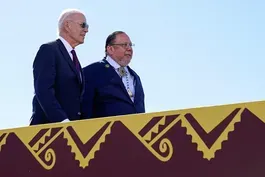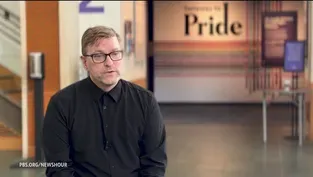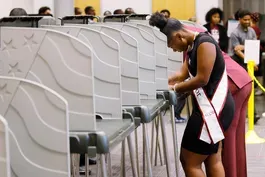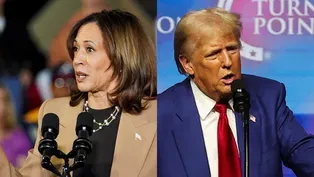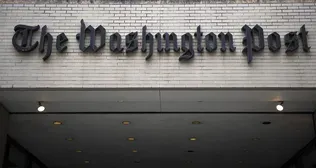
Brooks and Granderson on the presidential race deadlock
Clip: 10/25/2024 | 10m 6sVideo has Closed Captions
Brooks and Granderson on why the presidential race is deadlocked in the polls
New York Times columnist David Brooks and Los Angeles Times opinion columnist LZ Granderson join Geoff Bennett to discuss the week in politics, including why the presidential race is deadlocked, Harris' strategy of calling Trump a fascist and newspapers presidential endorsements.
Problems with Closed Captions? Closed Captioning Feedback
Problems with Closed Captions? Closed Captioning Feedback
Major corporate funding for the PBS News Hour is provided by BDO, BNSF, Consumer Cellular, American Cruise Lines, and Raymond James. Funding for the PBS NewsHour Weekend is provided by...

Brooks and Granderson on the presidential race deadlock
Clip: 10/25/2024 | 10m 6sVideo has Closed Captions
New York Times columnist David Brooks and Los Angeles Times opinion columnist LZ Granderson join Geoff Bennett to discuss the week in politics, including why the presidential race is deadlocked, Harris' strategy of calling Trump a fascist and newspapers presidential endorsements.
Problems with Closed Captions? Closed Captioning Feedback
How to Watch PBS News Hour
PBS News Hour is available to stream on pbs.org and the free PBS App, available on iPhone, Apple TV, Android TV, Android smartphones, Amazon Fire TV, Amazon Fire Tablet, Roku, Samsung Smart TV, and Vizio.
Providing Support for PBS.org
Learn Moreabout PBS online sponsorshipGEOFF BENNETT: Well, the presidential race is deadlocked with just over a week left of voting.
For more on the race for the White House, we turn tonight to the analysis of Brooks and Granderson.
That's New York Times columnist David Brooks and Los Angeles Times opinion columnist L.Z.
Granderson.
Jonathan Capehart is away this evening.
It's good to see you both.
So, the race for the White House, as we mentioned, rests on a razor's edge.
The New York Times and Siena College released their final poll before votes are counted.
It finds that Donald Trump and Kamala Harris are tied at 48 percent.
We should mention there's also a final nationwide CNN poll out today that finds them tied, but at 47 percent.
David, there is still no clear leader.
That has been a feature of this shortened race between Trump and Harris.
What's your take on where things stand some 11 days after?
DAVID BROOKS: Yes, I guess my vibe is that Harris obviously had a great first act.
She's sort of plateaued in act two and act three.
And so she began coming back to earth, I'd say two or three weeks ago.
And so she's now tied with Trump, whereas before she had a slight lead on the nationals.
It's very tied in the swing states.
But if you look at the models, the people who write models about all this kind of stuff, The Economist model has Trump with a 54 percent chance of winning.
I think some of the others have up to 59 percent.
So you would have to say in the last several weeks, Trump has had a good period.
And if anybody has momentum, he has slight momentum.
And I should emphasize the word slight.
But -- and that's reflected in where they're campaigning.
Trump is really trying to expand the base.
Harris is still doing some work trying to shore up what should be her base.
And that's not a great sign if you're in the final couple of weeks of a campaign.
GEOFF BENNETT: L.Z., Democrats had hoped that the more Donald Trump became Trump on the trail, that Harris would be able to capitalize on that and build a strong national lead.
That hasn't happened.
Why not?
L.Z.
GRANDERSON, The Los Angeles Times: Well, one, I don't know if we know what the national lead is going to be.
I think sometimes we conflate the conversation about the results with the Electoral College and the popular vote.
We know when it comes to the popular vote, Democrats have won pretty easily over the last 15 to 20 years.
And in case of both President Biden, as well as Secretary Clinton, even though Secretary Clinton lost, she won by millions of votes.
And so on the one hand based on the fact that she's a Democrat, you can expect the vice president to defeat Donald Trump by millions of votes.
This is a conversation about the Electoral College.
And that's the reason why it's close.
And we need to look at the history of Electoral College and what it's designed to do.
I don't think the fact that it's a close election from the Electoral College in 2024 really reflects where the nation is.
Most people have voted Democrat over the last 20 years.
GEOFF BENNETT: Well, this past week, shifting our focus a bit, John Kelly, Donald Trump's longest-serving White House chief of staff, told The New York Times that he believed Donald Trump met the definition of a fascist, that he would govern like a dictator if allowed, and had no understanding of the Constitution or the concept of the rule of law.
And "The Atlantic" reported this past week that Trump told Kelly he wanted the kind of generals that Hitler had.
Donald Trump denies all of this.
David, how does all of this strike you, the comments and the way in which Donald Trump's allies are rushing to defend him and discredit John Kelly?
DAVID BROOKS: Well, what General Kelly says is what most senior military people I talk to believe, General Mark Milley.
You look at Stan McChrystal, the former general, they really think Donald Trump would be a threat to the kind of military they dream of, which is a military that does its job of protecting America, but does not get involved in politics.
And so I think they're truly alarmed.
And what General Kelly said, I think comes out of a place of sincerity and strength.
Having said that -- and he knows.
He would know better than anybody else.
He was Donald Trump's chief of staff.
Having said that, as a political maneuver, I don't think the argument on fascism has been swaying voters.
And when I travel around the country talking to people about what they want to hear about, they don't take the fascism claim seriously, for -- rightly or wrongly, because they think, well, Donald Trump is already president, we didn't have a fascist government then.
And so, to me, the focus should not be on fascism for the Democrats.
It should be on the economy and on immigration.
It's the economy and inflation are the number one things that is moving people away from her.
And, to me, if she focuses on fascism, it will rile up -- it'll please a lot of people who are Democrats who really think the fascist threat is real.
And maybe they're right.
I just -- we're trying to get at the undecided voters, at the low-interest voters.
And I don't believe the fascism argument is a good way to close the campaign.
GEOFF BENNETT: What about that, L.Z.?
Because the vice president is set to deliver closing arguments next week at the Ellipse near the National Mall, the same place where Donald Trump spoke before that mob went and violently attacked the Capitol on January 6, 2021.
Is that a good use of her time?
Will it have the intended effect of crystallizing for voters the stakes, as Democrats see them?
L.Z.
GRANDERSON: I'm sure, for some people, it would crystallize it.
But I definitely agree with David, in the sense that the vernacular, the vocabulary that's being used, I don't think, is beneficiary.
It reminds me of when I covered 2016 and the word xenophobia was used to describe former President Trump.
And at that time, I was writing about and talking to other voters.
And it was like, well, what is this xenophobia?
What is it supposed to mean?
And how does this help me at the house with kitchen table issues?
And so I think, similarly, when you look at the word fascism, I think a lot of people don't know what it means.
And that takes up time to communicate your message.
To David's point, I think it'd be much more prudent of her, of the campaign, anyway, to focus in on the economy, as well as trying to show up votes around reproductive rights.
GEOFF BENNETT: And, David, I want to draw you out on a column that you wrote this past week where you more or less captured the moment.
And you said this election is happening too soon.
It's happening before cultural and civic preconditions are in place that might turbocharge political and legislative reform.
Say more.
What do you mean?
DAVID BROOKS: Yes, well, you asked earlier, why hasn't Kamala Harris built a big lead?
I just think that's not the way history has worked.
Politics doesn't lead society.
If you look at the big moments of social change, they happen with a formula.
The cultural change happens first, civic change happens next, and then political change.
So if you look at the 1890s, we used to have a very individualistic ethos called Social Darwinism.
It was replaced in the 1880s and 1890s with something called the Social Gospel movement, which is about community, which is about taking care of the poor.
And out of that philosophy grew a whole series of social movements, the settlement house movement, the environmental movement, the NAACP, the union movement.
And so you had all these social movements in the 1890s.
And then right about 1900, 1905, 1910, you get the political movement, which was the progressive movement, cleaning up government, then creating the Federal Reserve system, regulating food safety and things like that.
So it goes culture change, social movements, political change.
And Harris has not had the benefit of a cultural shift or the social movement explosion.
And so it's asking a lot of politics to lead the social change, unless you have the preconditions.
GEOFF BENNETT: In the time that remains, I want to discuss the news about the news, namely the landscape around the newspaper editorial board presidential endorsements, in this case, the nonendorsements.
L.Z., what is all of this signal to you, the moves by the owners of The L.A. Times and The Washington Post to not endorse in this race?
L.Z.
GRANDERSON: Well, as you noted, I'm an op-ed columnist of Los Angeles times.
And so I need to be careful with my verbiage here, so I don't find myself on the unemployment line.
But I will say this, I am extremely disappointed.
I have been covering national politics for 20 years, starting with Bush v. Gore.
Every newspaper I have worked at had endorsed.
And so, given what I have been reporting and writing over the years, certainly over the last couple of years, and what I have been reading in our own newspaper, I did not think that an endorsement was going to be something that was going to be controversial.
I don't know the background of the decisions of both The Times, as well as The Washington Post.
I would just say, as a journalist and as a professor of journalism, this is extremely frustrating and disappointing and does not meet the moment that the nation is at right now.
GEOFF BENNETT: David, how do you see it?
DAVID BROOKS: Pretty much the same way.
Most journalists will probably see the same thing.
We used to have yellow journalism in this country, where we had the owners really running the papers as personal ideological fiefdoms.
We crawled away from that over decades and decades, and that was hard-earned independence for journalists, that there's a Chinese wall between the business side of the paper and the editorial side of the paper.
And I think that Chinese wall is valuable to the integrity of our publications.
And when it seems like the owner is interfering with editorial decisions, then you have smashed the wall, you have hurt the integrity of the paper, and you may be trying to avoid retribution from Donald Trump, but at the cost of some level of integrity for your publication.
GEOFF BENNETT: David, in your view, are presidential endorsements by newspapers or newspaper editorial boards, are they necessary or effective these days?
DAVID BROOKS: No, but it's the principle of creating the -- creating this idea of editorial independence.
I think Sewell Chan said it earlier in the program, that I think state and local and judgeship, those kind of editorial endorsements are tremendously powerful.
I know I follow, frankly, The Washington Post editorial choices on a lot of local races, because I basically trust their judgment.
But on a presidential race, everybody has their own opinion already.
And, frankly, it's not a mystery which candidate The Washington Post actually supports.
GEOFF BENNETT: David Brooks... L.Z.
GRANDERSON: It's very frustrating to me.
If I just may... GEOFF BENNETT: Sure.
L.Z.
GRANDERSON: ... it's very frustrating as a journalist to work for a publication that won't endorse someone, when one of the candidates wants to arrest you for doing your job.
It's frustrating.
DAVID BROOKS: Absolutely.
GEOFF BENNETT: L.Z.
Granderson and David Brooks, thank you both.
Biden issues apology for Indigenous boarding schools
Video has Closed Captions
Biden issues 'long overdue' apology for federal Indigenous boarding schools (6m 55s)
The creator of LGBTQ History Month on sparking a movement
Video has Closed Captions
The teacher who created LGBTQ History Month reflects on how he sparked a movement (3m 27s)
Gaza crisis worsens as hospitals are overwhelmed amid war
Video has Closed Captions
Gaza faces medical crisis as remaining hospitals are overwhelmed amid war (6m 12s)
Gen Z voters could be deciding factor in who wins N.C.
Video has Closed Captions
North Carolina's Gen Z voters could be deciding factor in who wins the state (8m 36s)
Harris, Trump detour from swing states to campaign in Texas
Video has Closed Captions
Harris and Trump take a detour from swing states to campaign in Texas (4m 48s)
Israel launches retaliatory strikes on targets in Iran
Video has Closed Captions
Israel launches retaliatory strikes on military targets in Iran (2m 24s)
Why The Washington Post decided to opt out of an endorsement
Video has Closed Captions
Why The Washington Post decided to opt out of a presidential endorsement (5m 56s)
Providing Support for PBS.org
Learn Moreabout PBS online sponsorshipSupport for PBS provided by:
Major corporate funding for the PBS News Hour is provided by BDO, BNSF, Consumer Cellular, American Cruise Lines, and Raymond James. Funding for the PBS NewsHour Weekend is provided by...
